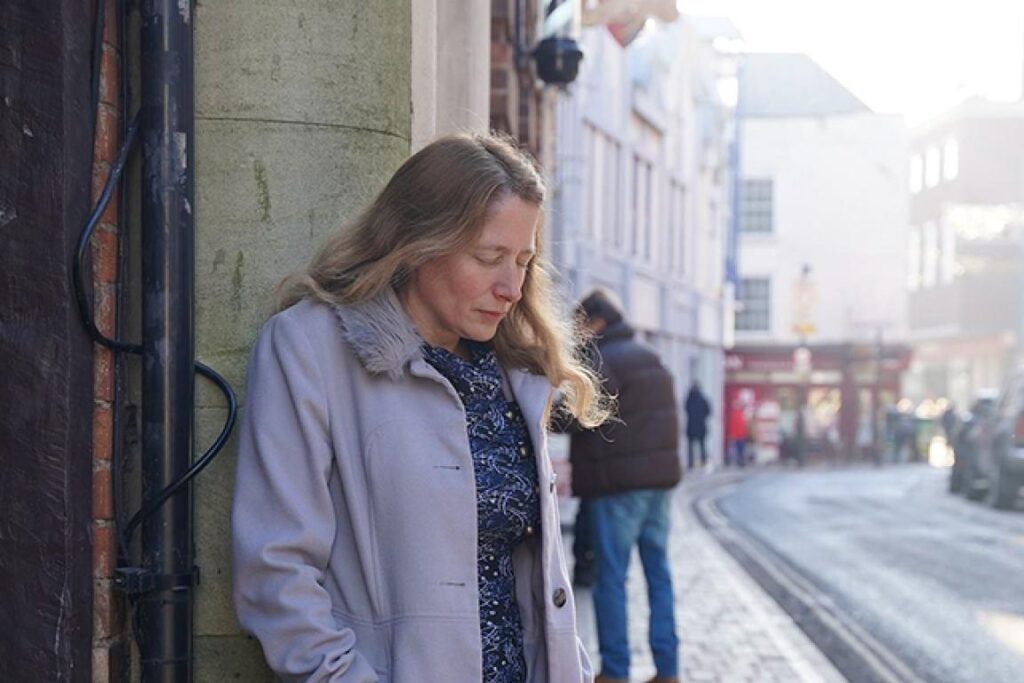- In its latest report, the US Commission on International Religious Freedom (USCIRF) highlights that the European governments have “targeted individuals for their peaceful religious expression”
- Arrest of Isabel Vaughan-Spruce for silently praying in an abortion “buffer zone” listed as primary example
- UK Home Office to release guidance on “buffer zone” policing imminently – abortion advocates lobby for silent prayer to be punished

LONDON (14th May 2024) – A U.S. federal government commission has called out the unjust arrest of a silently praying Christian in Birmingham, Isabel Vaughan-Spruce, in its annual international report.
The US Commission on International Religious Freedom (USCIRF) was established as part of the International Religious Freedom Act (IRFA), which mandates that U.S. policy includes condemning violations of religious freedom abroad and assisting foreign governments to protect this fundamental human right. Commissioners are appointed by the President and the leadership of both political parties in the Senate and the House of Representatives.
The 2024 annual report highlighted the high-profile arrest of Vaughan-Spruce as an example of European governments “targeting individuals for their peaceful religious expression”.
Responding to the news, Isabel Vaughan-Spruce said:
“Arresting individuals for silent prayer has put Britain in a position of global embarrassment. Nobody should be criminalised for their mere thoughts – this is a basic principle of a liberal democracy. If we can’t get that right at home, how are we meant to uphold human rights on the world stage?
I was searched, arrested, put in a police van, charged and placed on trial for a “thoughtcrime” – for peacefully and imperceptibly praying outside an abortion facility. With support from ADF UK, I was fully vindicated in court – but my case isn’t a one-off. The Home Office can prevent my arrest from recurring by clarifying in their upcoming guidance that, while we all condemn harassment, freedom of thought and consensual conversation must remain free.”
"Arresting individuals for silent prayer has put Britain in a position of global embarrassment. Nobody should be criminalised for their mere thoughts – this is a basic principle of a liberal democracy."
- Isabel Vaughan-Spruce, arrested, tried and fully acquitted after praying silently in her head in an abortion "buffer zone"
Arrested for a “Thoughtcrime”
Isabel Vaughan-Spruce was arrested twice in 2023 for silently praying in a “buffer zone” in Birmingham. A Public Spaces Protection Order had been installed by local authorities to ban all expressions of “approval or disapproval” of abortion on the streets near an abortion facility. In what is widely thought to be the first “thoughtcrime” case in 21st Century Britain, Vaughan-Spruce was charged even though she had prayed imperceptibly and not expressed any opinion outside of her own mind.
A Catholic priest, Father Sean Gough, was also charged for holding a sign within a buffer zone reading “praying for free speech”. Both were tried at Birmingham Magistrates Court and fully acquitted of all charges with legal support from ADF UK, after the prosecution were able to offer “no evidence”.
Two further individuals – Adam Smith-Connor and Livia Tossici-Bolt – will face trial later this year after both being charged with breaching “buffer zones” on separate occasions in Bournemouth.
Adam Smith-Connor, like Isabel Vaughan-Spruce, prayed silently in his head. Livia Tossici-Bolt, a long-term crisis pregnancy support volunteer, held a sign reading “Here to talk, if you want”.
Watch Isabel’s second arrest, sparking the condemnation of the US Commission, below:
You are currently viewing a placeholder content from YouTube. To access the actual content, click the button below. Please note that doing so will share data with third-party providers.
More InformationHome Office guidance expected to be published imminently
Yet several other members of parliament have spoken up for maintaining protections on silent prayer and consensual conversation in the guidance.
Andrew Lewer MP said:
“The Home Office guidance on buffer zones should at least protect these in order to uphold international standards on freedom of speech and of thought.
“While police crack down on these peaceful activities, they expose a double standard where protesters on different ideological issues are allowed much wider scope to express their beliefs.”

The final guidance is expected to be published imminently.
Speaking about the “thoughtcrime” trials seen in Britain, Jeremiah Igunnubole, legal counsel for ADF UK said:
“The principle of freedom of thought and speech must be defended both within and outside ‘buffer zones’. To his credit, the Home Secretary has, thus far, sought to keep our country in line with international law by underlining the importance of protecting freedom of thought as an absolute right, and protecting the right to freely engage in consensual conversations, which is the lifeblood of any genuinely thriving democracy.
That said, it is crucially important that he holds firm in the face of concerted pressure from a vocal minority of backbench MPs who, unsatisfied with introducing arguably the most censorial legislation in modern British history, are now seeking to criminalise the innermost thoughts of law abiding citizens and even consensual discussions. These efforts of a handful of Labour and Conservative backbenchers are nothing short of Orwellian and are undoubtedly the first step to the normalization of state-endorsed content-based censorship,” commented Jeremiah Igunnubole, legal counsel for ADF UK.


